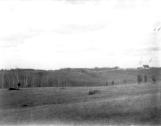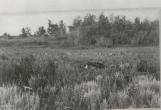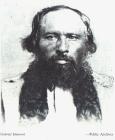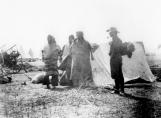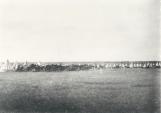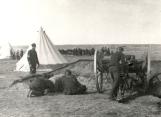2
Four years after the battle, Gabriel Dumont gave the following account of the encounter at Duck Lake:"We went back to Duck Lake, and we had scarcely let our horses out to eat, when we heard someone shout again, 'Here come the police.' We immediately jumped on horseback, and without delay I had my men occupy a hillock which commandded the plain, and from where the enemy would have been able to level their guns on us.
We were only a few men on horseback and a few men on foot, waiting for the police who had been reinforced by eighty men commanded by Crozier, who had rejoined McKay's forty runaways. They had a cannon with them.
I sent, in pursuit of their scouts, several men to whom I gave orders not to shoot because Riel had asked us not to be the first to fire.
I gave orders to my horsemen, who numbered 25, to go down into a hollow, where we were under shelter from the cannon.
Crozier, accompanied by an English half-breed, approached one of the our Indians who was unarmed and, it seems, gave him his hand. The Indian then tried to grab the gun out of the hands of the English Métis who was, I believe John Dougal McKay. This English Métis fired, and I think it was this rifle shot which killed my brother Isidore and made him fall from his horse, stone dead….
As soon as the shot was fired, the police and the volunteers commanded by Crozier, fired a round, and the Indian who was with my brother, was killed….
As soon as the shooting started, we fired as much as we could. I myself fired a dozen shots with my Winchester carbine, and I was reloading it to begin again, when the English alarmed by the number of dead, began to withdraw. It was time they did, for their cannon which until then had kept my infantry men from descending the slop, was silenced because the gunner, in loading it, put in the shot before the powder. My infantry men then began to surround them.
This first encounter had lasted half an hour.
In their flight they had to go through a clearing, so I lay in wait for them saying to my men, 'Courage, I'm going to make the red coats jump in their carts with some rifle shots.' And then I laughed, not because I took pleasure in killing, but ti give courage to my men.
Since I was eager to knock off some of the red coats, I never thought to keep under cover, and a shot came and gashed the top of my head, where a deep scar can still be seen; I fell down on the ground, and my horse, which was also wounded, went right over me as it tried to get away. We were 60 yards from the enemy. I wanted to get up, but the blow had been so violent, I could't. When Joseph Delorme saw me fall again, he cried out that I was killed. I said to him, 'Courage, as long as you haven't lost your head you're noy dead.'
While we were fighting, Riel was on horseback, exposed to the gunfire, and with no weapon but the crucifix which he held in his hand….
The enemy was then beginning to retreat, and my brother, who had taken command after my fall, shouted to our men to follow and destroy them. Riel then asked, in the name of God, not to kill anymore, saying that there had already been too much bloodshed….
After the enemy had fled, my companions tied me on my horse, and we went to Duck Lake, where my wound, which was a deep one, was dressed…."
Gabriel Dumont
4
Mural depicting the Battle of Duck Lake.9 December 2003
Duck Lake Regional Interpretive Centre Duck Lake, Saskatchewan, Canada
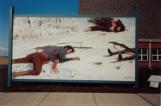
5
"The Battle of Duck Lake" - Artist Ru Huang's preference for silence over clatter and sadness over jubilance is evident in this work, as he conveys the solemn, tragic, and moving aftermath of the conflict. It is as if the Metis fighter, even in death, is clutching the precious ground he died for; while the Policeman and the Volunteer, who died no less nobly or tragically, appear to be strangers to the land.The Battle of Duck Lake was fought at a point west of the townsite and was the major event leading to the North West Uprising of 1885.
This first encounter was won handsomely by the Metis people - it was a hollow victory!
You can find this mural outside the Regional Interpretive Center in Duck Lake, Saskatchewan.
6
These are bullets found at the battle site for the Battle of Duck Lake.1885
Duck Lake Regional Interpretive Centre Duck Lake, Saskatchewan, Canada
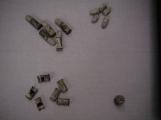
7
Names on the monument of the Metis killed in the Battle of Duck Lake.1955
Batoche National Historic Site
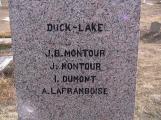
9
The North West Field Force, a federal army of eight thousand and led by General Frederick Middleton, was raised because of the events at Duck Lake and Riel's gathering of Métis and First Nation supporters at Batoche.11
Front of the Metis position at Fish Creek. Several horses were killed in this battle.April, 1885
Fish Creek, located south of Batoche
